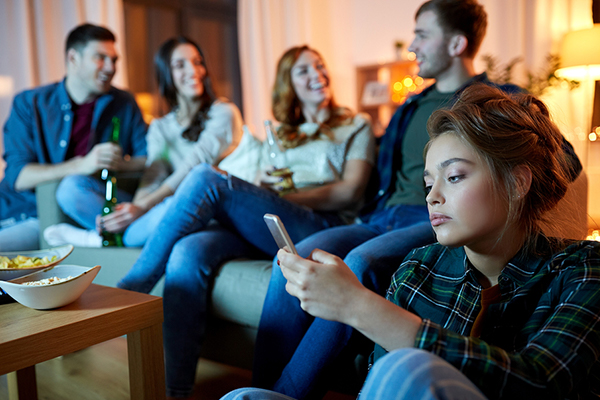“Technology isn’t good or bad—it really comes down to how people use it,” said Dr. Dale Peeples, a psychiatrist at Augusta University Health who works with young adults and children.
“Too much” is different for everyone, but here’s what it can look like.
Gaming Disorder
Gaming disorder is being recognized by the World Health Organization as an official diagnosis in its next iteration of the International Statistical Classification of Diseases.
“Really, we’re looking at the impact on how you function,” said Peeples. “Are you failing to meet obligations in life because gaming is consuming everything you’re doing?”
The disorder is being compared to substance abuse or a gambling addiction. “People can get moody or irritable when they have to break from it, similar to what you see with withdrawal of substance use,” he said.
Social Media
Some research has been done on social media, but there’s a lot of debate out there on the actual effect of social media on our psyches.
“The design of these systems call for user engagement. You’re meant to keep your eyes on it; that’s how these are designed, and they are successful: You do have a lot of people spending more time on it than they’d like,” said Peeples. “So you can view it as an addiction.”
The happiest users of social media tend to go into it with a set purpose then sign off—compared to most of us who look up and realize, “Whoa, I’ve been on Instagram for the past hour.” Those of us who seem to lose ourselves in social media tend to have worse mental health outcomes, said Peeples, which has led to the idea of “Facebook depression,” from comparing our own lives to the supposedly happier ones we’re seeing online.
“But research also shows that people who are having trouble or who are depressed are spending more time online,” said Peeples. “So is this behavior bringing on the depression or vice versa? It’s difficult to say which way it’s going.”
Online Shopping
Whether you have an Amazon Prime problem or a Target obsession, we all recognize how satisfying it is to be able to order exactly what we want from the comfort of our sofa in just a few clicks.
But if you have obsessive compulsive tendencies, it could all start going downhill from that “just one” purchase. Targeted ads through social media can also feed any weakness you have in this area. “Say if watches are your thing, and you make one purchase, then you keep seeing them on Instagram. It can be a cycle that’s tough to avoid,” said Peeples.
Balancing Real Life with Virtual Life
Technology’s meant to make our lives better. If it’s not doing that, then try these to regain your balance:
- Set your budget. Many of us set up financial budgets to reassess how much we’re spending or overspending. Do the same with your tech time. Start by just taking a real look at how much time you’re spending on gaming, social media or online shopping—and actually time yourself. Then balance that against how much time you want or need to spend sleeping, at work or school, with friends or family, doing hobbies, and more. “This gives you a sense if your time with electronics is cutting into time with other domains,” said Peeples. “Being mindful of this is the first step.”
- Ask a friend. If you’re in denial—but in the back of your mind, you wonder if you do have a problem—ask a friend or family member who’s involved enough in your life to have an opinion but who’s not also invested in your same technology. (For example, asking your gaming buddy if you’re spending too much time gaming is a non-starter). Ask if they feel like your tech use has become an obstacle in how you function or in your relationships.
- Then, set a goal. Just like with money, set a goal of how much time you want to spend with technology. It’s going to be different with every person, but be realistic—and also make yourself stick to your goal.
- Turn electronics off about an hour before you plan to go to bed. Sure, maybe you’re afraid you’re going to miss out on an important post from your friend group or that big sale for another clothing item that you really don’t need. But electronics use is clearly related to poor sleep hygiene, which tends to make you more irritable, which can lead to more tech use, and so on and so on. So give yourself a break and see if you feel better.
- Use social to support face-to-face connections. Instead of just chatting with friends over Facebook, message them to see about getting together. Then, share photos of your #girlsbrunch or #movienight on social, but keep the cycle of face-to-face get-togethers going.
Need professional help?
For more information about behavioral health or to schedule an appointment with someone who can help, call 706-721-6597, or visit augustahealth.org/behavioral-health. However, if you or someone you love is suffering a mental health emergency and may be a threat to themselves or others, please call 911 immediately.
To find a primary care physician or schedule an appointment at Augusta University Health, visit augustahealth.org, or call 706-721-2273 (CARE).





